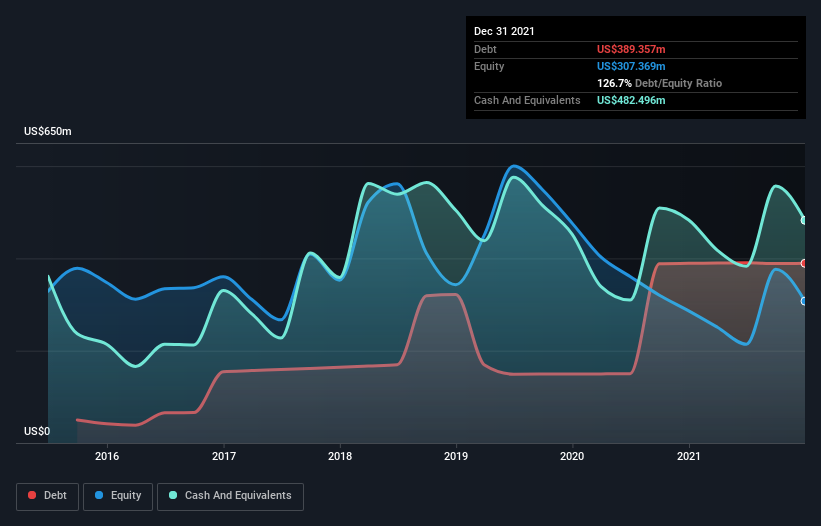- United States
- /
- Biotech
- /
- NasdaqGM:FOLD
Is Amicus Therapeutics (NASDAQ:FOLD) Weighed On By Its Debt Load?
The external fund manager backed by Berkshire Hathaway's Charlie Munger, Li Lu, makes no bones about it when he says 'The biggest investment risk is not the volatility of prices, but whether you will suffer a permanent loss of capital.' So it seems the smart money knows that debt - which is usually involved in bankruptcies - is a very important factor, when you assess how risky a company is. As with many other companies Amicus Therapeutics, Inc. (NASDAQ:FOLD) makes use of debt. But should shareholders be worried about its use of debt?
When Is Debt A Problem?
Generally speaking, debt only becomes a real problem when a company can't easily pay it off, either by raising capital or with its own cash flow. If things get really bad, the lenders can take control of the business. However, a more common (but still painful) scenario is that it has to raise new equity capital at a low price, thus permanently diluting shareholders. Of course, plenty of companies use debt to fund growth, without any negative consequences. The first thing to do when considering how much debt a business uses is to look at its cash and debt together.
See our latest analysis for Amicus Therapeutics
What Is Amicus Therapeutics's Net Debt?
The chart below, which you can click on for greater detail, shows that Amicus Therapeutics had US$389.4m in debt in December 2021; about the same as the year before. But on the other hand it also has US$482.5m in cash, leading to a US$93.1m net cash position.

How Healthy Is Amicus Therapeutics' Balance Sheet?
According to the last reported balance sheet, Amicus Therapeutics had liabilities of US$146.0m due within 12 months, and liabilities of US$451.8m due beyond 12 months. Offsetting this, it had US$482.5m in cash and US$52.7m in receivables that were due within 12 months. So it has liabilities totalling US$62.6m more than its cash and near-term receivables, combined.
Of course, Amicus Therapeutics has a market capitalization of US$1.85b, so these liabilities are probably manageable. However, we do think it is worth keeping an eye on its balance sheet strength, as it may change over time. Despite its noteworthy liabilities, Amicus Therapeutics boasts net cash, so it's fair to say it does not have a heavy debt load! When analysing debt levels, the balance sheet is the obvious place to start. But it is future earnings, more than anything, that will determine Amicus Therapeutics's ability to maintain a healthy balance sheet going forward. So if you're focused on the future you can check out this free report showing analyst profit forecasts.
Over 12 months, Amicus Therapeutics reported revenue of US$306m, which is a gain of 17%, although it did not report any earnings before interest and tax. That rate of growth is a bit slow for our taste, but it takes all types to make a world.
So How Risky Is Amicus Therapeutics?
Statistically speaking companies that lose money are riskier than those that make money. And the fact is that over the last twelve months Amicus Therapeutics lost money at the earnings before interest and tax (EBIT) line. And over the same period it saw negative free cash outflow of US$206m and booked a US$250m accounting loss. But at least it has US$93.1m on the balance sheet to spend on growth, near-term. Overall, we'd say the stock is a bit risky, and we're usually very cautious until we see positive free cash flow. When analysing debt levels, the balance sheet is the obvious place to start. But ultimately, every company can contain risks that exist outside of the balance sheet. We've identified 2 warning signs with Amicus Therapeutics , and understanding them should be part of your investment process.
When all is said and done, sometimes its easier to focus on companies that don't even need debt. Readers can access a list of growth stocks with zero net debt 100% free, right now.
New: Manage All Your Stock Portfolios in One Place
We've created the ultimate portfolio companion for stock investors, and it's free.
• Connect an unlimited number of Portfolios and see your total in one currency
• Be alerted to new Warning Signs or Risks via email or mobile
• Track the Fair Value of your stocks
Have feedback on this article? Concerned about the content? Get in touch with us directly. Alternatively, email editorial-team (at) simplywallst.com.
This article by Simply Wall St is general in nature. We provide commentary based on historical data and analyst forecasts only using an unbiased methodology and our articles are not intended to be financial advice. It does not constitute a recommendation to buy or sell any stock, and does not take account of your objectives, or your financial situation. We aim to bring you long-term focused analysis driven by fundamental data. Note that our analysis may not factor in the latest price-sensitive company announcements or qualitative material. Simply Wall St has no position in any stocks mentioned.
About NasdaqGM:FOLD
Amicus Therapeutics
A biotechnology company, focuses on discovering, developing, and delivering novel medicines for rare diseases in the United States and internationally.
Undervalued with reasonable growth potential.
Similar Companies
Market Insights
Community Narratives




